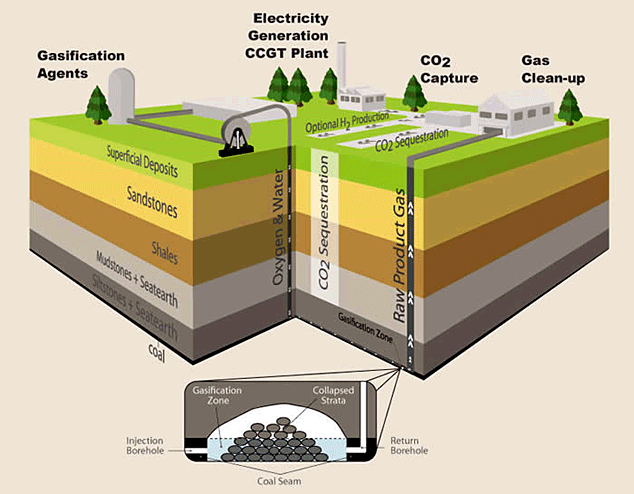Algy Cluff: the North Sea oil pioneer on securing Britain’s energy future
In part one of an exclusive interview, legendary resources entrepreneur Algy Cluff talks about his new venture – underground coal gasification – and his concerns over Britain's energy security.
Get the latest financial news, insights and expert analysis from our award-winning MoneyWeek team, to help you understand what really matters when it comes to your finances.
You are now subscribed
Your newsletter sign-up was successful
Want to add more newsletters?

Twice daily
MoneyWeek
Get the latest financial news, insights and expert analysis from our award-winning MoneyWeek team, to help you understand what really matters when it comes to your finances.

Four times a week
Look After My Bills
Sign up to our free money-saving newsletter, filled with the latest news and expert advice to help you find the best tips and deals for managing your bills. Start saving today!

Forty years on from having helped pioneer the discovery of North Sea oil and gas, Algy Cluff has returned to his former stomping ground, keen to write a new chapter in his extraordinary career. In part one of an exclusive interview with Kam Patel, the legendary resources entrepreneur talks about his new venture and his concerns over the UK's long-term energy security.
Read part two of our exclusive interview here:Algy Cluff - I like to think I helped open up Africa to investors'
Few serial entrepreneurs can boast of a career as long, varied and colourful as oil, gas and minerals legend Algy Cluff. He is 74 years old, but looks as dapper and imposing as ever when I meet him at his Westminster offices. Time has clearly not dimmed his enthusiasm for new challenges nor his forthright manner.
MoneyWeek
Subscribe to MoneyWeek today and get your first six magazine issues absolutely FREE

Sign up to Money Morning
Don't miss the latest investment and personal finances news, market analysis, plus money-saving tips with our free twice-daily newsletter
Don't miss the latest investment and personal finances news, market analysis, plus money-saving tips with our free twice-daily newsletter
Two years ago, Cluff real name John Gordon Cluff decided to "liberate" himself from his successful Ivory Coast gold business, Amara Mining, and bid farewell to Africa after 35 years of mineral exploration across the continent.
He quickly plotted a return to the hunting ground where he first made his name and fortune the North Sea. It was there 40 years ago that Cluff Oil, a consortium he put together in the early 1970s, discovered the Buchan oil field. The field, later sold to BP, is still producing today.
His latest venture, London-listed Cluff Natural Resources (LSE:CLNR), initially focused on conventional North Sea oil and gas exploration. But Cluff knew that there was another potential deep offshore energy source there, one that has intrigued him ever since his drilling forays there in the 1970s: coal.
"Under the North Sea there is a vast quantity of potential energy coal but which cannot be mined conventionally"
"We drilled a number of exploration holes in those days in the central part of the North Sea. I was very struck by the thickness of the columns of coal, not oil, that we went through to our dismay, because we were looking for oil.
"It is quite striking that under the North Sea there is such a vast quantity of potential energy coal but which cannot be mined conventionally as it is too deep. We were oil-driven, so we didn't pay too much attention to it. But the huge scale of its presence has always stuck in my mind."
Cluff Natural Resources listed in May 2012, raising £3.75m. It wants to liberate the energy from these deep underground offshore and inshore coal seams using a technology called underground coal gasification (UCG). This involves pumping oxygen and steam through a small borehole into the coal seam to produce controlled combustion that converts the coal into syngas'. The gas a combustible mixture of methane, hydrogen and carbon monoxide is then pumped to the surface and transported to an onshore processing plant.
The company has so far secured 100% working interests in eight deep UCG licences in the UK ,covering Carmarthenshire and the Dee Estuary, the North Wales/Merseyside border, the Firth of Forth near Kincardine, north Cumbria, and Durham.
Britain's vast hidden reserves of coal energy
A major factor that has convinced Cluff of the viability of deep UCG as an energy source is the advances in drilling technology over the years. "It is now possible to drill horizontally from onshore to offshore and then back, which cuts costs markedly. Our licence applications are focused on where the coal is of the right quality, but also where it is adjacent or close to either commercial users, or to refineries."
The company took an important step forward with its plans to build the UK's first UCG demonstration plant late last year, after it revealed an initial resource estimate for the Kincardine licence in the Firth of Forth. It reported that two of the coal seams identified there have 43 million tonnes of coal in place, or the equivalent of 1.4 trillion cubic feet of natural gas in place. (For perspective, one billion cubic feet of gas could serve roughly 11,000 homes for one year).
Cluff says that the amount of coal contained in just of five of his company's licences is analogous to around four billion barrels of oil: "We are talking massive figures here."
He insists UCG can make a valuable contribution to the UK's fragile long-term energy security. "In the past we had a supply surplus. Now we import 50% of our gas. And in the future there will be a major supply deficit," he says, adding that the government itself expects that by 2030 domestic natural gas will only meet around 25% of domestic demand.
"Deep UCG is a major development. We are blessed. Most other countries don't have anything like this resource."
"The more I look at this energy situation, from a purely British standpoint, the more it worries me. It is becoming more and more apparent that ultimately we'll have to import more and more and more gas. There is talk of converting 20 coal-fired power stations to gas-fired power stations. But where is the gas going to come from? We'll have to import it. So here, with deep UCG, I believe, is a solution to the problem. There are other partial solutions, but deep UCG is a major development, which I think we've got no alternative but to address from a security point of view. We are blessed. Most other countries don't have anything like this resource."
While the technology itself is well established, there are very few live UCG projects around the world. And it has never been deployed offshore as Cluff intends. Of the live projects, there is a major producing plant in Uzbekistan and another two in Australia. There are, however, many UCG proposals under development, including in India, South Africa, Spain, Russia, Canada and the US.
"I've got no animus against any other form of energy. But it's the deliverability which is the key. UCG has the deliverability and the scale. It is quite simple in the sense that there is very limited exploration risk because we know the coal is there. We know what the characteristics of the coal are. The technology has been used or is being developed all over the world for onshore. So there are no serious impediments from the technology point of view. It is really more about the process of securing planning permissions, and how long that takes, which is the issue."

UK shale gas: 35,000 holes in Lancashire
The UK's burgeoning army of frackers, of course, also insist that they can deliver. But Cluff reckons the situation for them is complicated: "The first thing to note with fracking is that it involves drilling a lot of holes. Someone has put it on record that there would need to be 35,000 holes drilled in the Bowland Basin [a 746 square-mile site in Lancashire] alone to make an appreciable impact on our energy situation. Also, it's been rendered controversial, partly because the prime minister elected to stand up and say it is the solution to our problems. Well, it's going to have a tough time getting through the planning process, that's all I can say."
He believes one of the keys to the success of the shale business in Britain will be the response by industry to the government's 14th round of onshore licensing, launched in July 2014 and currently underway. What the government badly needs, he says, is a robust, positive response to the round from the oil and gas industry, with a lot of strong American companies who know what they're doing applying for the licenses. However, the energy landscape has changed a lot in just the past few months, with the plunge in the oil price.
"With this fall in the price of oil, fracking is now very expensive. And you are constantly moving, always in a planning context, moving on to the next hole, and then the next. So I question whether it's going to have the impact that the prime minister believes it will have. Also, there does seem to be a kind of unusual alliance between the British public and the environmentalists in rejecting it."
"Over the next few months you will see some pretty horrendous stories, with fracking businesses going bust"
Leaving aside the politics and environmentalists, the fall in the oil price is certainly a big drag for the frackers. "It's extraordinary what is happening. I remember sitting next to the vice president of Conoco at a dinner a few months ago. He was saying they're getting out of everywhere in the world and focusing purely on America and shale. But now US frackers are hanging on to the edge because they all over-borrowed. Not Conoco, of course, but many of the smaller frackers. So I think over the next few months you will see some pretty horrendous stories, with fracking businesses going bust over there."
Cluff is sure that rates of shale exploration in the US are dropping. He also reckons the sector is becoming more controversial: "They have largely dealt with the wide open spaces and are getting nearer and nearer the conurbations, with all that that implies."
US frackers may be suffering badly from the fall in oil price but Cluff is confident it will eventually reverse. He is looking for it recover to the $100/barrel level in two to three years' time at which point, if all goes well, Cluff Natural Resources might well have a UCG plant up and running.
The next step for Cluff Natural Resources
Fracking might be exercising the public and environmentalists but deep UCG too has come in for criticism. Cluff says: "We respect everyone's views and are very happy to engage over concerns. It's our judgement that their fears are unfounded.
"There have been rather excitable descriptions of coal mines being on fire with UCG. Some are but they are all onshore mines, where you cannot protect and secure the oxygen access to them. With us, there is only one point of access, and we are in control of it, so we can cut off the oxygen supply if it is judged to be necessary, which we can't imagine needing to do. So that doesn't constitute a coherent threat in our view."
Cluff's UCG operations will no doubt continue to steal the media limelight. But he is keen to point out that there have been some very positive developments with the company's more conventional gas ambitions too. It applied for some exploration licences in the 28th offshore round and was far more successful than anticipated: "We thought we might get one or two but we managed to secure 11, so we're thrilled by that. To think we applied in the fourth round of licensing that was back in 1972 and it was the first large round the first to come about after it became apparent the North Sea was going to contain a lot of oil and gas."
There will be a lot of seismic work relating to the new licences during 2015. The company has managed to raise £3m specifically for UCG. But, as ever for an exploration minnow looking to go places but devoid of cashflow, more money will inevitably be needed. There are several options open to Cluff on that, including farming out one or all of the licences; structuring a joint venture with a larger company, or by accessing its own shareholders.
In an ideal world he would prefer not to tap the shareholders again. He'd rather go with one of the first two options and keep dilution as low as possible. Indeed, the company is already in talks with some major players, not oil companies as such, but rather downstream players such as potential gas customers and engineering companies.
Considering the size of the Cluff Natural Resources it has a market cap of just £5.5m the shareholder register makes for impressive reading. Key shareholders include Hargreaves Lansdown (9.3%), Guinness Asset Management (8%) and Henderson Global (8%). Cluff himself has a 7.5% stake in the business.
Part 2 of Moneyweek's exclusive interview with Algy Cluff will be published tomorrow Algy Cluff: the North Sea oil pioneer on securing Britain's energy future.
Get the latest financial news, insights and expert analysis from our award-winning MoneyWeek team, to help you understand what really matters when it comes to your finances.
Kam is a former deputy editor at Hemscott Invest and online editor, City A.M and he was also previously the Digital Editor at IFA Magazine. Kam is currently a senior journalist at The Global Treasurer and contributes to MoneyWeek. Kam shares expertise on the FTSE 100, investing and global stocks.
-
 Should you buy an active ETF?
Should you buy an active ETF?ETFs are often mischaracterised as passive products, but they can be a convenient way to add active management to your portfolio
-
 Power up your pension before 5 April – easy ways to save before the tax year end
Power up your pension before 5 April – easy ways to save before the tax year endWith the end of the tax year looming, pension savers currently have a window to review and maximise what’s going into their retirement funds – we look at how

